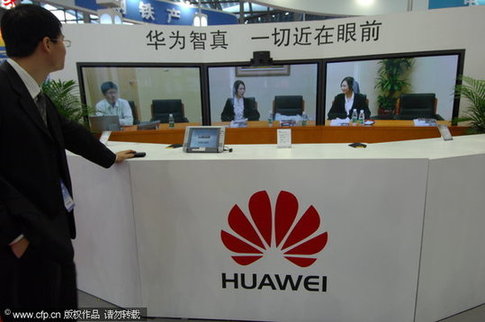Huawei outshines rivals in telecom equipment mart
Chinese technology firm Huawei Technologies is set to become the second largest telecom equipment provider in the world in terms of revenue by the end of the year, cashing in on its strong order wins both at home and abroad.

The company may, however, find the going tough in the long run as it has to encounter tapering demand and stiff competition from its rivals, warn experts.
Unlike most of the other Chinese firms, Huawei earns nearly 70 percent of its revenue from the overseas markets, while the domestic market accounts for the balance. That in turn, has also made the privately-held Huawei one of the most successful Chinese firms overseas.
Fang Meiqin, associate director with research firm BDA China, said yesterday that Huawei's revenue is likely to go up by 21 percent this year to $18.4 billion. That would help the Chinese firm to leapfrog over its nearest rival Nokia Siemens Networks which has forecast a full year revenue of $15.7 billion.
Fang said Huawei has gained significantly over its rivals Alcatel Lucent and Nokia Siemens Networks both of whom have expected their revenue to fall 22 percent and 26 percent respectively this year due to the economic downturn.
"I think this is a great breakthrough for Huawei, as Nokia Siemens Networks is a really strong rival," said Fang. The Chinese firm may still face considerable challenge to dislodge market leader Ericsson from the top slot as the Swedish company has forecast full year revenue of $26 billion.
According to a recent report from research firm Dell'Oro, Huawei has already bagged the second position in the global mobile network gear market during the third quarter of this year. The Chinese firm has nearly doubled its market share in this segment to 20 percent from 11 percent last year.
Last year, Huawei reported operating revenue of $18.3 billion, making it the fourth largest telecom equipment provider in the world, said BDA China.
A major chunk of Huawei's revenues this year came from the country's massive telecom spending for 3G services and related telecom equipment. The three main telecom companies in the country are expected to invest nearly $41 billion to build 3G infrastructures by 2011.
Fang from BDA China said China's capital spending is expected to increase 11 percent this year due to the 3G licensing and the government's stimulus package.
But what has made industry experts wake up and take notice was when the Chinese firm outbid its rivals Ericsson and Nokia Siemens and bagged the order to build a fourth generation (4G) mobile network in Norway.
 0 Comments
0 Comments







Comments